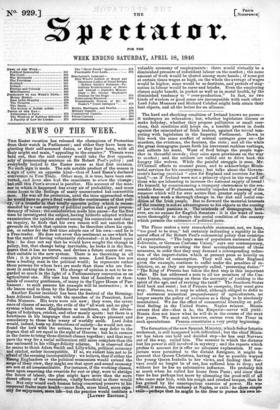The Times makes a very remarkable statement, not, we hope,
"too good to be true," but certainly indicating a rapidity in the moral effect of Sir Robert Peel's commercial policy that outstrips all expectation. " The large mass of population embraced in the Zollverein, or German Customs Union," says our contemporary, " are impatiently awaiting the final accomplishment of those measures, in order that they may demand a corresponding reduc- tion of the import-duties which at present press so heavily on many articles of consumption. They will not, after England gives the example, continue to suffer under the penalties of re- strictive, or, as they are improperly called, I protecting duties.'" "The King of Prussia has taken the first step in this important affair. He has addressed a note to all the members of the Cus- toms Union, impressing on them the necessity of yielding to the spirit of the age, and of revising the tariff." The Southern States hold back and resist ; but if Prussia be energetic, they must give way. France, too, it may be added, although obliged to defer to her enormous numerical preponderancy of agriculturists, no longer asserts the policy of exclusion as a thing to be absolutely maintained. We see the effect of commercial liberality on poli- tical feeling in the United States. Naples relaxes. Russia swears that she—that is he, the Emperor—never will yield : Russia does not know what he will do in the course of the next few years. We need not, however, outrun even the Times in such speculations. Prussia constitutes a very pretty beginning.


























